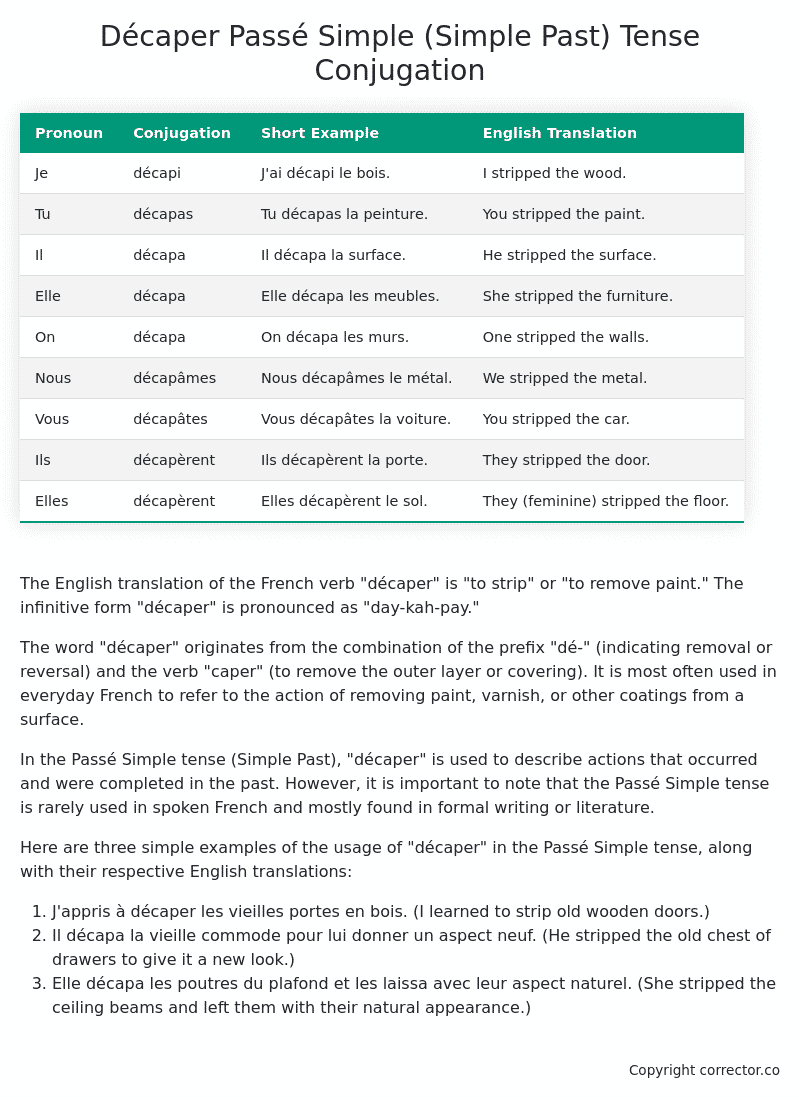Passé Simple (Simple Past) Tense Conjugation of the French Verb décaper
Introduction to the verb décaper
The English translation of the French verb “décaper” is “to strip” or “to remove paint.” The infinitive form “décaper” is pronounced as “day-kah-pay.”
The word “décaper” originates from the combination of the prefix “dé-” (indicating removal or reversal) and the verb “caper” (to remove the outer layer or covering). It is most often used in everyday French to refer to the action of removing paint, varnish, or other coatings from a surface.
In the Passé Simple tense (Simple Past), “décaper” is used to describe actions that occurred and were completed in the past. However, it is important to note that the Passé Simple tense is rarely used in spoken French and mostly found in formal writing or literature.
Here are three simple examples of the usage of “décaper” in the Passé Simple tense, along with their respective English translations:
- J’appris à décaper les vieilles portes en bois. (I learned to strip old wooden doors.)
- Il décapa la vieille commode pour lui donner un aspect neuf. (He stripped the old chest of drawers to give it a new look.)
- Elle décapa les poutres du plafond et les laissa avec leur aspect naturel. (She stripped the ceiling beams and left them with their natural appearance.)
Table of the Passé Simple (Simple Past) Tense Conjugation of décaper
| Pronoun | Conjugation | Short Example | English Translation |
|---|---|---|---|
| Je | décapi | J’ai décapi le bois. | I stripped the wood. |
| Tu | décapas | Tu décapas la peinture. | You stripped the paint. |
| Il | décapa | Il décapa la surface. | He stripped the surface. |
| Elle | décapa | Elle décapa les meubles. | She stripped the furniture. |
| On | décapa | On décapa les murs. | One stripped the walls. |
| Nous | décapâmes | Nous décapâmes le métal. | We stripped the metal. |
| Vous | décapâtes | Vous décapâtes la voiture. | You stripped the car. |
| Ils | décapèrent | Ils décapèrent la porte. | They stripped the door. |
| Elles | décapèrent | Elles décapèrent le sol. | They (feminine) stripped the floor. |
Other Conjugations for Décaper.
Le Present (Present Tense) Conjugation of the French Verb décaper
Imparfait (Imperfect) Tense Conjugation of the French Verb décaper
Passé Simple (Simple Past) Tense Conjugation of the French Verb décaper (You’re reading it right now!)
Passé Composé (Present Perfect) Tense Conjugation of the French Verb décaper
Futur Simple (Simple Future) Tense Conjugation of the French Verb décaper
Futur Proche (Near Future) Tense Conjugation of the French Verb décaper
Plus-que-parfait (Pluperfect) Tense Conjugation of the French Verb décaper
Passé Antérieur (Past Anterior) Tense Conjugation of the French Verb décaper
Futur Antérieur (Future Anterior) Tense Conjugation of the French Verb décaper
Subjonctif Présent (Subjunctive Present) Tense Conjugation of the French Verb décaper
Subjonctif Passé (Subjunctive Past) Tense Conjugation of the French Verb décaper
Subjonctif Imparfait (Subjunctive Imperfect) Tense Conjugation of the French Verb décaper
Subjonctif Plus-que-parfait (Subjunctive Pluperfect) Tense Conjugation of the French Verb décaper
Conditionnel Présent (Conditional Present) Tense Conjugation of the French Verb décaper
Conditionnel Passé (Conditional Past) Tense Conjugation of the French Verb décaper
Conditionnel Passé II (Conditional Past II) Tense Conjugation of the French Verb décaper
L’impératif Présent (Imperative Present) Tense Conjugation of the French Verb décaper
L’impératif Passé (Imperative Past) Tense Conjugation of the French Verb décaper
L’infinitif Présent (Infinitive Present) Tense Conjugation of the French Verb décaper
L’infinitif Passé (Infinitive Past) Tense Conjugation of the French Verb décaper
Le Participe Présent (Present Participle) Tense Conjugation of the French Verb décaper
Le Participe Passé (Past Participle) Tense Conjugation of the French Verb décaper
Struggling with French verbs or the language in general? Why not use our free French Grammar Checker – no registration required!
Get a FREE Download Study Sheet of this Conjugation 🔥
Simply right click the image below, click “save image” and get your free reference for the décaper Passé Simple tense conjugation!

Décaper – About the French Passé Simple (Simple Past) Tense
Formation
Usage
Narration
Historical Context
Interactions with other tenses
Passé Composé
Imparfait
Conditional and Subjunctive
Summary
I hope you enjoyed this article on the verb décaper. Still in a learning mood? Check out another TOTALLY random French verb conjugation!


